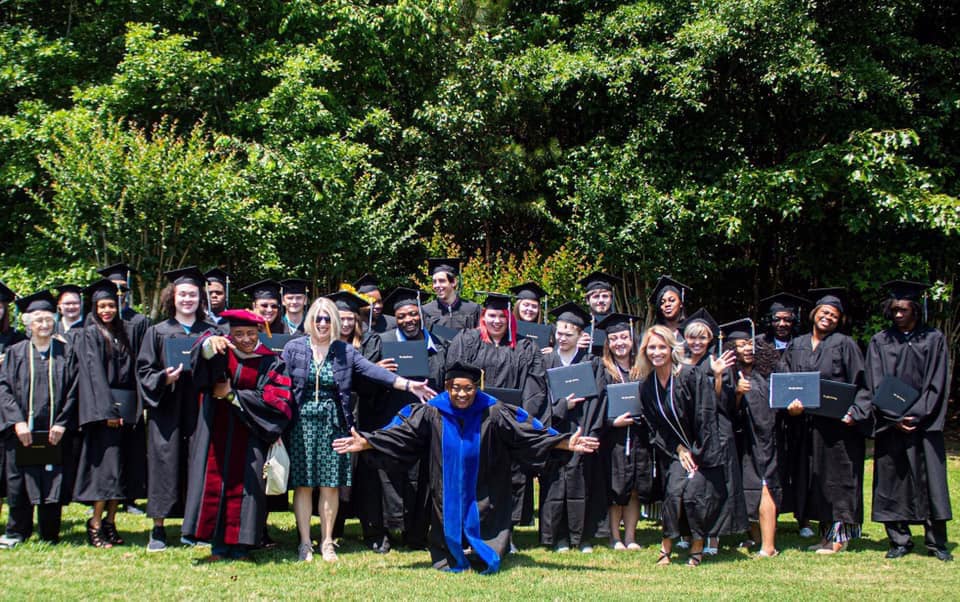
New Year, New You: It’s Never Too Late To Graduate
New Year, New You: It’s Never Too Late To Graduate
The new year is a time of possibilities. It’s an opportunity to reimagine who we are, to examine our long-term goals, and set intentions for how to get closer to them.
For many people, those goals include continuing their education. Particularly for non-traditional students or adults who didn’t finish high school, earning a high school diploma can unlock a wide range of professional opportunities and set them on the path to achieving their goals.
Still, that’s often easier said than done. Returning to school as an adult or a non-traditional student can come with a lot of barriers and challenges. However, with the right alternative diploma program, finishing your high school diploma is very possible—even enjoyable. Here, we’ll discuss the benefits and obstacles associated with returning to school, and how you can be sure that the program you choose will set you up for success.
The Benefits of Having a High School Diploma
As of 2017, 13% of Georgia’s population aged 25 and over were still missing a high school diploma. While that number marks a significant decrease from recent decades, it still means that more than one in ten people in Georgia are missing this crucial piece of their education.
If you’ve been out of school for a little while, you might find yourself wondering whether a high school diploma is really necessary. How much of a difference can a diploma really make?
The answer is: a big one. Extensive data indicates that having a high school diploma is associated with a slew of positive outcomes. These include:
- earning more money
- being more competitive for both new jobs and promotions
- eligibility for other educational opportunities, like college and graduate school
- reduced risk of poverty and unemployment
- better overall health
Obstacles for Non-Traditional Students
The reasons for dropping out of school are many and varied. For some individuals, those reasons include needing to work to support their family, becoming a mother or father, or serving as a caregiver for a sick or disabled family member. Other common reasons include not liking school, being bullied, not being able (or not believing they were able) to keep up with schoolwork, or too many absences.
Circumstances like being in the foster care system, experiencing homelessness, and falling prey to sex trafficking can further compound these difficulties. For example, research has shown that students in foster care are more likely to experience exclusionary school discipline, be forced to move between schools, and experience trauma, all of which can disrupt (or derail) their educational progress.
Sadly, many of the same factors that prevent some people from completing their high school education in the first place often persist into adulthood. People with families and/or children to support often struggle to balance their commitments at home or work with attending school. And even if they can find the time, they may lack the financial resources to pay for school. On top of that, individuals who have been out of school for a long time often struggle with feelings of low confidence, or are afraid that they simply aren’t cut out for school.
It’s Not Too Late
If any of the difficulties or feelings above sounded familiar to you, know that you’re not alone, and that your experiences and feelings are valid. However, they don’t have to continue to define your future.
In many cases, the problem isn’t the individual—it’s the fact that existing alternative diploma programs aren’t designed to accommodate and support the non-traditional student. In choosing a high school diploma program, it’s essential that you find one that offers a flexible and realistic schedule, and that takes a strength-based approach to learning.
The Tiers Free Academy Homeschool Cooperative Adult Diploma Program offers a radical solution for non-traditional students. Whether you’re coming back to school after a protracted break, have been unable to pass the GED, are aging out of foster care, or something else entirely, the Tiers Free Academy can benefit you.
Tiers Free Academy is a trauma-informed online homeschool curriculum designed to accommodate academically invisible students. It was designed by someone who has firsthand experience with the failings of the traditional education system. Tiers Free takes a strengths-based approach to learning, meaning that students are able to pick up where they left off, rather than having to start over entirely. That means that even if you only completed part of your high school curriculum, you can count those credits towards your diploma. The online-only program format also allows students to work at their own pace, without having to sacrifice work hours or family time on a commute or in-person learning.
The Dr. Annise Mabry Foundation is dedicated to improving our community by enhancing education opportunities, promoting synchrony between law enforcement and constituents, and encouraging community engagement. Our programs and initiatives include the Southwest GA Community Policing Resource Center and the Tiers Free Academy, a homeschool cooperative for students in grades 9-12 that provides an alternative diploma program for homeless LGBTQ youth, sex trafficking survivors, and high school dropouts. To learn more about our offerings or support our work, consider subscribing to our newsletter or donating today!



No Comments